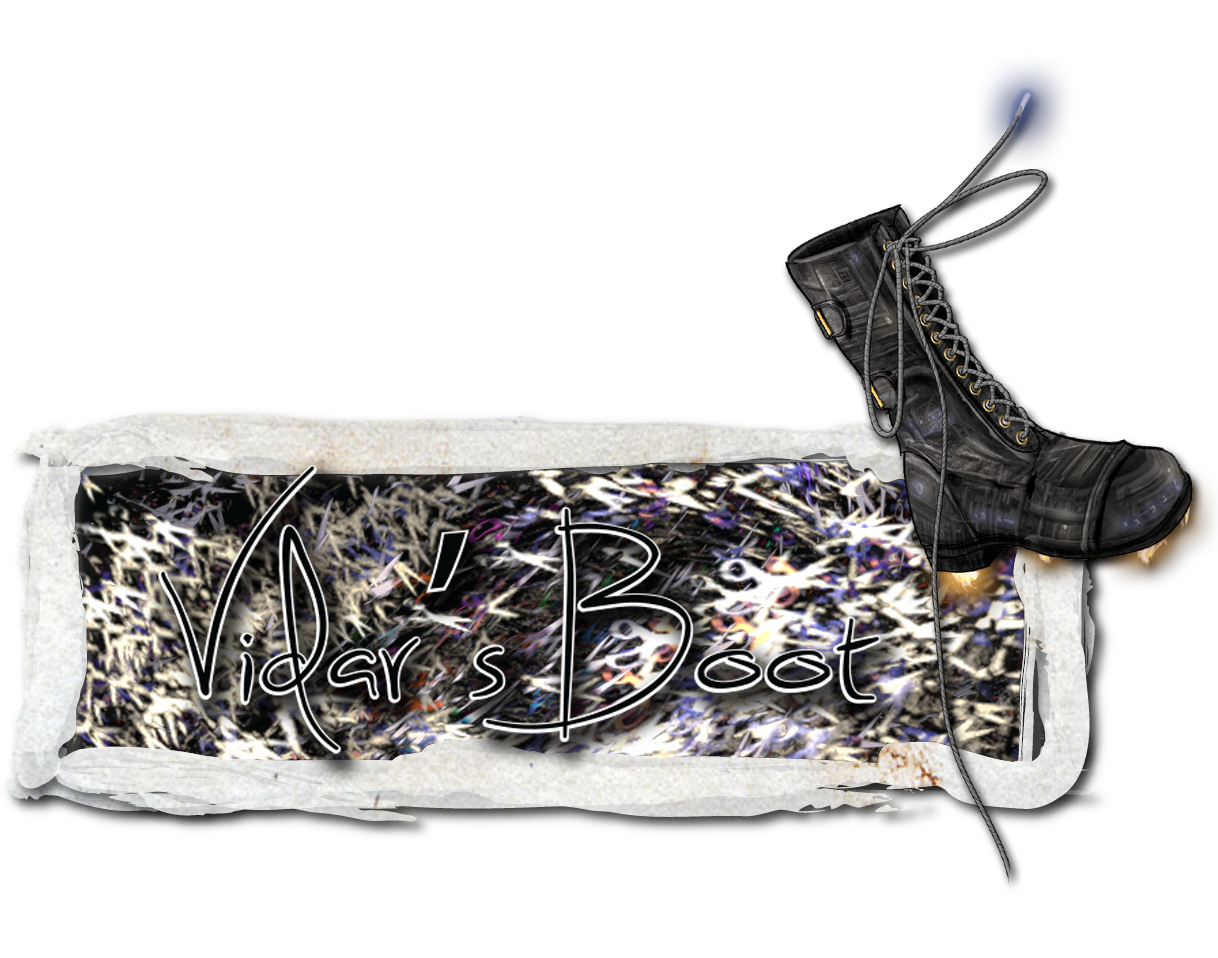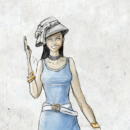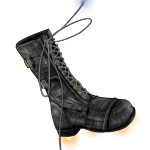– 1 –
In the headquarters of Konami a young executive named Mr. Koga stands. He has been inspired. He has dreamed, as Mr. Matsuda dreamed.
“I have seen it,” he says.
He looks far away.
“In my dreams they crash down before me,” he says. “The lightning and the red. And fire lashes up from the sewers to take me, and it eats me, down to my bones; and God is with me, then, he is telling me, thus ends all mortal hope.
“I am dead,” he says. “I am the walking dead. For I have died in dreams. But from the land of death I bring a jewel. I have seen it. I have seen how to fix the greatest flaw in the Konami Thunder Dance. It is the truth that is given to me by God.”
He is fired for his presumption. Then later the company sends a thunder dancer and two programmers to talk to him. They speak to him late into the night.
They return with a jewel of knowledge, clutched to them like a sacred hat.
“We can do it,” they report, to the board of directors. “We can patch the hole. We can close out Dynamite.”
– 2 –
St. Bethany sits on a rooftop and she stares out at the campus and she is in despair. She is a girl for whom there is no happy ending. She is a girl for whom there cannot be hope.
After Bethany’s been sitting there a while Lucy flows out of the darkness.
Lucy stands there in silence.
She wears a pale hat.
“I wasn’t really trying to make friends,” Bethany says. “When I talked to you earlier.”
They had spoken earlier.
“I mean, I loathe you,” St. Bethany explains.
“I know,” Lucy says.
She sits down.
“I don’t want to talk to you,” Bethany stresses, in case Lucy had misunderstood this. “You’re not a nice person. Thing. Person-thing.”
“I don’t have anyone else that I can talk to,” says Lucy.
“It’s amazing,” says Bethany.
“Please,” Lucy says.
Bethany puts her head in her hands. After a while, she says, “Fine.”
“Do you know rock-paper-scissors?” says Lucy.
“I know it,” Bethany says.
“Not trissors,” Lucy clarifies.
“I know it,” Bethany says.
“Not hobbit-Spock-spider, either,” Lucy explains.
“I was old enough to know rock-paper-scissors,” Bethany says, “before the scissors fell.”
People mostly stopped playing rock-paper-scissors, when the scissors fell.
“I guess it wasn’t as weird for you,” Bethany realizes, “if you were living out there, in space.”
“Okay,” Lucy says, after a while.
“So?” Bethany says.
“So I used to play it,” Lucy says, “in space. Rock-paper-scissors. At the evil academy. I became very good at it.”
“You can’t be good at —” Bethany starts.
“I became very good at it,” Lucy emphasizes. “Better than Cyber-Merlin. Better than the Luck Witch. Better’n practically anyone. Like, if we were to play right now, what would you throw?”
“Rock,” says Bethany.
“So, I’d win,” says Lucy.
“That’s amazing,” says Bethany. “Truly a victory worthy of an evil prophet of space.”
“But there are intimations,” Lucy says. “Hints. Shadows.”
“Sid?”
But Lucy shakes her head.
“I don’t . . . think so,” says Lucy. “I think — I think your stupid planet has the rock-paper-scissors player that will be the death of me. And I think he is a goat.”
Bethany blinks.
She looks over.
“OK,” she says, “You’re way losing me. Why would you play rock-paper-scissors with a goat?”
“Pride,” says Lucy.
Bethany hesitates. “And . . .why would that kill you?”
Lucy shrugs.
She points over at the chapel. “Chapels always throw rock,” she says. “Because they’re chapels. Right?”
“. . . right?” Bethany guesses.
“So,” says Lucy, “one, two, three.”
Don’t do this to a chapel! People pay good money for those things.
“Wow,” says Bethany, looking between the chapel and the paper that Lucy Souvante has thrown. “That never happens when I play.”
Lucy shrugs.
“I just get, like, Leonard Nimoy appearing out of nowhere to sing about hobbits or whatever. At most.”
“You are a degenerate, sub-human species,” says Lucy, inaccurately. “You have lost the true game, given to you by God.”
“No,” says Bethany.
“Well,” says Lucy, “I suppose that a saint might know more than a prophet.”
Bethany sighs.
“The Church doesn’t actually acknowledge us,” she says. “It turns out that there is this whole process that doesn’t rely on having somebody put a magic hat on you at all. At most we are officially cardinals.”
“That’s the spirit,” says Lucy, who is, after all, an evil prophet. “Look upon the meaninglessness of the world and despair!”
They do this for a while as the last few bits of chapel sift slowly to the ground.
After a while St. Saul comes and joins them.
“Despairing at the meaninglessness of the world?” Bethany asks him.
“Stomachache,” says Saul.
“Have one or are one?” Lucy asks. Sometimes she eats people.
Saul raises an eyebrow at her.
“Just asking,” Lucy explains.
– 3 –
Edmund doesn’t know his heart doesn’t belong to him. He doesn’t know his father sold it to a dwarf-smith long ago.
So it means something, I think, that he’d probably have just given it to Bethany — if she’d asked him — on that day, when the two of them encountered in the quad.
It doesn’t mean much —
I mean, they’re not a romantic story. They’re not even an unromantic story. They’re more like a light that blew out.
But it means something.
At the very least he’d have been nicer, if he could have — to her, I mean, not to the people that he slaughtered and ate. He might have wanted to fight her, well, you know, less hard, or maybe even, eventually, not at all.
He doesn’t get the chance. Not then.
In November she takes his heart from him, he Edmund of the House of Hunger; she steals his heart in its cold stone box.
She tosses it into the air while he is recovering.
She draws back her fist for a stone-shattering punch.
And neither of them knows that it’s not even his property! Although, well.
I mean, Joffun’s a convict, and the Gulleys have money and power.
It might not have been a legitimate sale.
– 4 –
Edmund shifts his stance.
He stretches his palm forward and he does a nithrid move.
Fingers of lightning flow from him, eddy along the ground, and kick upwards towards her; she skitters back.
He twists; he takes a step, he brings his hand down, and the skies open; he calls a spear of argent fire down upon her. She is already moving through ninja space, not visible in the world of mortals, turning and turning as she comes.
He scatters the bolt as it falls. It splits and shatters, turns into a thousand traceries of light, and when she reappears it is in the middle of one of them.
She is in the middle of a wince of pain from that when the box with his heart in it finishes its fall and it hits the ground.
His eyes go blank. His world stutters.
Then he is surging towards her, uncontrolled, and he is not human but a wolf in movement; from the moment his back foot leaves the ground to the moment that his forward foot lands he is not a boy at all but a howling beast; and then Edmund again, just barely, just in time to strike his palm against her nose and for her to intend, and utterly fail, to shove a sword straight through his knee.
“Damn it!” she gargles, because that means she has to add a shilling to the intended maiming, the failed maiming, and the damning jars. Also, because her nose hurts. She traps Edmund’s leg, tumbles him over, and tries to grab the box again. She doesn’t succeed.
“Oh, Hell,” she says, as if to complete some sort of set.
She’s off-balance. He’s got her. He’s got a hand on her shoulder and her t-shirt — unfair, she thinks, at how he can kill her and she can’t reply, how saints apparently can’t even stab a boy’s leg without their holiness interfering — and he hisses, “I don’t want to fight—”
She twists.
She catches his thumb as she is moving. “Fine way,” she says, and she pulls it back, levers herself free; and then, with a sudden grin of realization, pulls him around with it, laughs as his own unwillingness to have his thumb broken lets her spin him around to the ground with it without actually hurting him, “of showing it —”
She makes eye contact for a moment. It’s a mistake on her part.
White flares through his eyes.
It pulses.
His hunger drowns out her vision. Her heart catches in her throat. Her mouth goes dry. She is still moving, she thinks, she may even still be fighting, but she cannot see.
She cannot hear.
She cannot taste.
She wonders if she has killed him, or he her. She wonders if there is still a world anywhere. She wonders what it actually means, to be alive.
She reaches for herself but for a moment she cannot find herself. For a moment, the impact of that hunger has split her between herself and her image; her concept of herself wanders off from her being; she is suddenly dual, the saint and the Bethany, under the impact of that white wolf-boy’s stare.
She staggers backwards. Her vision swims. Her spirit wavers. Then she refocuses.
He is frowning.
And behind him —
“That was interesting,” he says, thoughtfully, but she doesn’t have time any more to deal with him. She dissipates and she leaves him to fight her shadow instead.
She prays he won’t see through it, won’t come after her —
There’s a much bigger problem St. Bethany has now.
It has noticed Edmund playing with lightning down below; it is bearing in on the school; it is cutting its way along the roads and paths with limbs of tree-trunk-wide lightning: the nithrid.
It was reborn at the Lethal Magnet School for Wayward Youth not that many months ago.
It was chased away from the school for a while by its duel with Emily; but now the living storm, the nithrid, is coming home.
– 5 –
Once upon a time there was a storm that saw itself, and in that seeing became nithrid.
It became a thing of the divine fire. It lashed itself about with itself and exalted itself with its own savage glory. It knew the dreams and fears that storms awaken and it aspired to them — became the god we see in storms.
It saw that it was frightening and it grew more fearsome.
It saw the substance of its rage and it grew more fierce.
It wound and unwound itself, spread itself over the world devouring storms, and laughed at the workings of svart-elves and humankind; it dreamed to smash all the works of civilization, to leave it burning and in ruins, and to drive the observing masses back to cower and whimper in the caves.
In this it failed.
Hans caught it; bound it in human flesh; lined the cage of its bones with knives; and lid it in its nithrid-hole, deep beneath the Earth.
Hans sealed it, kept it, protected us;
But Hans is dead.
It skirls the Earth now like a centipede of lightning; one limb of it cuts through Edmund’s old dormitory and it doesn’t even slow down. It just sears a line through the building and leaves the remnants to lean to either side.
– 6 –
It’s probably less than half a minute before she’s in the gun emplacement in the bell tower. It feels like it took her half her life.
She kicks on the anti-magnet. She boots up the nithrid absorption machine. She swings the sky whitener around whole-bodied, holds its grips in her hands, slips her feet into its pedals, and fires into the oncoming storm.
It’s not a person, right? It’s not violence. It’s just a storm. You can shoot the weather, it’s OK to shoot the weather —
It’s not OK! She shrieks. It’s not OK! It’s not OK!
Her spirit defocuses again. She is gasping. Her pores are bleeding. She tries frantically to not have shot at the nithrid, over and over tries to exert her power to not have done that, but the deed is already done.
There is a viscous wound of clarity in the middle of the sky.
I’m just anthropomorphizing, she thinks. It’s not alive. It’s not a person. Only, it’s screaming —
Saul, incidentally, is terrible at being a saint.
“Dang,” Bethany says, as the lightning comes down for her. “I’m worse’n Saul.”
– 7 –
This isn’t the story of the nithrid’s redemption, so I’m not going to tell you how it had been wrestling with its conscience for some weeks.
I’m not discussing the fact that Emily beat it, and then spared it —
That it had argued with Peter; that Martin had spoken to it, and Jane; that it had begun to think about whether there might be other career options out there for a gigantic, civilization-destroying storm.
I’d have played that up if the nithrid were going to become a better person here, but that’s not what happens. I’d play that up, in fact, even if the nithrid weren’t going to become a better person here, if the nithrid were going to stumble on the path to grace and fall tragically back into damnation because of an unprovoked attack.
But that isn’t what this story is about.
This story, as I’ve mentioned, is about Mr. Enemy.
So, you know what?
Let’s skip that whole redemption . . . stuff.
Maybe the nithrid was on the verge of becoming a magical happy-puppies-and-rainbows-for-everyone kind of storm. Maybe it was working its way back up to being a threat to the human world. Maybe it had stopped killing people entirely. Maybe it was just dieting, you know, cutting back.
I don’t know where things would have been about to have gone. I don’t know how they should have been.
I just know that they didn’t get there.
Lightning strikes.
The bell tower explodes, with Bethany in it.
The bells go ringing, ringing, falling through the sky.
– 8 –
This isn’t the story of the nithrid’s redemption. Bethany has hurt it. She has angered it. She has caught its attention, whole and entire; she is lit among the wind and the rain, her red hat and red hair and red eyes practically glowing; and the nithrid intends to kill.
– 9 –
She is standing on a bell for a moment.
Lightning shears through it. She is in the sky, but the wind has caught her. It drags her in towards another lashing bolt. Her t-shirt and sweatpants are burning. She rolls sideways through ninja space. She flows. She emerges in a fluttering of red silk garments, clothes stolen from a place that is not a place, to land against another falling bell.
She is sweating. She is bleeding. She has the fixed grin of someone struggling to remain coherent in the face of a fever, staying up too late, or an excessive quantity of drink.
She is tense enough that she is subtly vibrating; it spreads into the metal of the bell.
Less than a second of stillness; of falling; of trembling; and the lightning lashes out at her again.
She is ready this time. She is braced and desperate. She catches it. She pulls it around. She flows with it, tori to its uke, and hurls it past her; catches the next arc, pushes it down, grounds it in the bell; she leaps, then, because the bell is burning, and she is turning and turning and she is all but climbing the lightning as it comes.
Flutters of lightning pull free from the main body of the storm. They stream about her, tearing off of, freeing themselves from, and unfolding from the nithrid and becoming extensions of the silks of her as she moves. When she lands —
It is balanced on a telephone pole, swaying and shuddering in the storm —
Streamers of red silk and dancing lightning settle around her like a bird’s feathers and long tail. The light fades around her, save for the occasional twining, errant gleam.
This is the beginning.
This is the beginning of our story — this bit, with Bethany and the nithrid. And more than that.
This is the beginning of the world; when the last feather of her settles, and her eyes open and they are gleaming red.
It strikes at her. The lightning strikes at her.
She can hear the beating of her heart.
She catches the lightning. She turns it. She pulls it around and sends it back into the storm. And there is the next beat: it pounds in her.
As if a voice were speaking:
There’s no turning back now!
A second blast falls.
The wind kicks her off the pole she’s standing on. She doesn’t mind that. She flutters with it. She lets it happen. She lets the wind carry her; and when the lightning comes at her a third time, and she is falling, she is near the ground and —
Well, not her death, considering, but it might have been a fatal fall for some —
She uses the force of that blast, tacks against it like a sailboat against the wind, lets it throw her back into the air even as she bends the bolt itself off to curl off harmlessly through the Principal’s window and set fire to the outbox on his desk.
It’s OK, half-eaten Principal! It’s not important! Your secretary was just going to dump that in the incinerator in any case!
A fourth blast strikes. A fifth.
Rain is lashing at her. Wind is cutting at her. The lightning is all around her and she can hear it, beating faster now, driving, guiding it: the pounding of her chest-bound heart.
Once upon a time, there was a storm that saw itself, and became a nithrid.
Once upon a time, surrounded by that storm, there was a girl who saw herself as well.
She witnesses herself: she coats herself in vanity and aspiration; she sees herself, and all her eaten hopes, as magic. She catches up that magic and weaves it around and around her and into her red and lightning coat. She idealizes herself, she the saint named Bethany, and then she steps across the divide between reality and its images and she embodies that ideal that she has conceived.
The wind pushes her faster.
The nithrid kites her out over the ocean. It tries to lash her down into the waves. She skips hard against the water, like a stone thrown to perfection; it should scour her, it should break and batter her, but it doesn’t; it is as if the sea is padded —
Her Housemate St. Peter’s blessing is a sovereign protection against stormy weather at sea.
She tastes salt and blood in her mouth, nevertheless.
Then she is up in the air again. Then she is turning. Then she is catching the sea in the sleeves of her top, twisting it up, and hurling up a wave into the lightning to send dissonance through the structures of the nithrid’s mind.
The nithrid’s scream shatters her.
Why does she keep doing this? Why does she keep hurting it? She didn’t plan on hurting it —
Her lungs are clotted with blood. She is crying it. She is whimpering. She is lost and helpless for a moment, and had she been any lower or any less than Bethany she would have gone down and she’d have been drowning —
But it takes the nithrid longer to recover than it takes the saint.
Its thoughts are expressed in lightning; its self-awareness is in and through the storm; unable to see itself through the diffraction, the nithrid spends a long and terrible moment dead.
Bethany has time to stagger to a halt on the ocean’s surface.
She has time to look up at the seething, twisting storm, and twist her face.
Then the nithrid wakes itself from death with a shudder. Then it is screaming. Then it is in such a rage as it has never known before; then it is as if Heaven speaks one great word in lightning to manifest its hatred for such saints:
(Such a word! I cannot write down the nithrid’s word herein.)
It stretches from horizon to horizon; it is as if the whole sea were ionized now and throwing up a single sheet of fire towards the clouds.
– 10 –
She doesn’t want to fight it.
It suddenly occurs to Bethany that, as a girl with no hope, a girl who doesn’t want to inflict pain on other creatures, she doesn’t actually want to be fighting a gigantic civilization-destroying storm. It isn’t a very good life move.
Her heartbeat is so terribly loud.
She skips back as the lightning rises; moves her hands. She cuts it, positive left, negative right, and it drives her upwards. She climbs the column of lightning to a gasping height of space.
She isn’t entirely sure how to explain things to the nithrid —
“I don’t want to fight —” she starts.
The nithrid strikes her down.
It is the nature of Tom’s hat to grant a certain kind of perfection. From the moment she’d crowned herself with his kether-hat, Bethany has been one thing exactly; as a light shining from the past to the future, unbowed, unbending, and perfectly straight.
The wind blows and the lightning lashes, and it moves faster, and she is turning and turning and the clothes of her are woven with red and lightning, and the nithrid does not stop, for day after day it drives her and it does not stop; but neither, in those conditions, will or, for that matter, can she.
She throws aside the thousandth bolt as she threw aside the first one.
The nithrid’s four thousandth attack, just the same.
She touches ground for a moment in Glasgow, one-footed. Not long after she is tumbling across Madrid. She is a world-spanning movement; she is in Dunsbury, then Cowbridge; Tondern, then Alagir; Suzhou —
It is not until she reaches Tokyo that she does anything that might be considered a mistake at all; and even that is because she has lost her own perfect hat, her own millinery invention. Even that is because the ultimate hope of a happy ending has been stripped from her —
And it may have been intentional, nevertheless.
She doesn’t think so! Even in the private corners of her soul, she doesn’t think so!
But there may be a deeper and more private corner of Bethany, where even Bethany herself is not allowed to go —
She concedes this —
That has always thought being the one to destroy Tokyo Tower would be cool.
– 11 –
She has a blind spot. It is not much of one, but it is there. It is a blind spot. And the lightning comes at her through it, or she lets the lightning come at her through it, and it shears her sideways through Tokyo Tower. She goes writhing through most of the girders but is forced to sunder others with her swords — or, in one case, with her back, and a scream of agony — before cratering down into a Tokyo road.
As the Tower creaks and topples behind them, the nithrid slams down at her like the hammer of the gods.
It isn’t quite enough.
The earth won’t take her; or, rather, there’s a sewer line under her. She comes back up. She is flung up, in fact, on a miraculously purified spray of sewer water from a manhole three blocks further; there are rose petals mixed into the spraying white. And fire follows after, the sewers incandescent with the nithrid; it bursts up from every opening: it scatters birds, ignites a lurid poster, and consumes an ex-Konami executive; it devours him utterly and hope, at least for one Mr. Koga, passes forever from the world.
It’s kind of sad, she thinks. She might have had the skill to save him, if only Edmund hadn’t eaten her hope-wove hat.
Then the wind throws her slewing and stuttering from the sky above Japan and such thoughts depart.
Her second mistake is over Australia.
It has been almost four days now. She has been fighting the nithrid for four days, and she has never felt better in her life; she is entirely used to it, now; she is feeling good with it, she has started to like it, her heart and life smoothed over with purpose, the battle become more of a dance — but ba-bump stumbles her heart, suddenly, over Australia, a flare of white and fear and the remembered eyes of the cannibal Edmund, and suddenly she is alone, suddenly she is afraid, suddenly the sandwich she’d seized up in passing from a beer garden in Bavaria and eaten seems far too little and far too long ago.
She is just a girl, then, suddenly, a secondary school girl, tumbling down into a patch of ground that probably has a zillion nasty poisonous predators and/or rabbits in it while a raging world-ending storm attacks her, and she hasn’t seen the sun in days.
The nithrid’s attacks are sometimes imprecisely distinguishable and frankly I haven’t always been perfect in counting, so I don’t know for sure on the numbers; but somewhere around bolt four thousand nine hundred and seven —
The nithrid fries her.
It sears her. It is only the strands of nithrid woven into her clothing, itself turning aside itself, that save her; even so, she is burning, her hair is singed and smoking, and she is unable to remember which direction is up and which is down.
This should be very easy as she is falling towards Australia. The brown direction should be the ground and the green direction should be the sky, or possibly the other way around; but in any case, she realizes as her eyes film and then clear again, there isn’t any other way to go but red.
Ba-bump goes her heart. She veers into the ninja space, the space outside of space, and gains a solid three seconds of breather in a place where she cannot breathe —
It’s less efficient than most breathers, in that sense —
And she has time to think: what in God’s name am I doing?
She isn’t even sure whether she refers to “fighting the nithrid” or “almost losing.”
She retreats then, just a little. She is scared, just a little, now. She stands for a moment on the head of a drop bear and feels suddenly, terribly guilty as the nithrid turns it into a roast.
She skitters back towards England, and the school.
It is very simple, she thinks. She will get help from . . . Saul? Peter? Tom? Principal Goethe? Possibly Tom will put his hat onto the lightning.
And suddenly, out over the sea somewhere, she can’t help laughing.
Maybe it’s the visual of the lightning in a hat. Maybe it’s the sudden memory that Principal Goethe cannot possibly help her, because he’s just this vaguely imposing-looking Principal (and dead, and also half-eaten). Maybe it’s just everything all at once.
She curls in on herself atop the water. She can’t keep flying. She can’t even keep standing.
She’s on her knees, with her hands on the surface of the sea, and she’s laughing, and she knows that this is the moment. This is the moment when she’s dead.
It’s always been inevitable, ever since her happy ending was devoured.
– 12 –
Only, she doesn’t die.
That’s not what not having a happy ending means.
She laughs, and she shudders, and it becomes almost funny, the way it’s not killing her, the way it’s waiting for — she’d guess — the perfect moment?
She doesn’t know.
She doesn’t die.
– 13 –
And after a while, she rolls over on the ocean —
I don’t know if she can do this because she is a trained fighter; or because of St. Peter’s blessing; or because she is a saint —
And the laughter has gone from her, and a wild mood is on her, and she is explaining herself to the nithrid because, well, to who else?
She is saying, “I made a hat, you know. After Tom’s hat —
“I made one of my own.”
The nithrid is fire in the sky. It is a world-devouring storm. It is wind and rain and the flickering of lightning.
“There is a space beyond the world,” she says, “where someone trained in the ninja arts may go; and a space beyond that, where hope is locked in a wardrobe, and you can bend it down with the power in you and make it into clothing or a hat.”
The nithrid is not interested in millinery.
If ever it had the power to impress others by rocking a hat and a bit of modern fashion, it lacks that power now.
“So I took the substance of that place and made a hat that had no equal in the world; and it was red, red, red, to match my heart.”
She listens to her heart. It is beating.
“And it was a hat of the substance of happy endings,” says she. “It was the hat that says: in this world, things will be OK.
“If you are good and strong, Bethany.
“If you seize it, Bethany.
“If you will fight for what is worth fighting for, and do what a Bethany ought to do, and live, and love, and linger well, then everything will end OK. No matter what.
“To be a person in the world — it is to be enough.
“It’ll be OK.”
The nithrid ponders this. It makes sculptures out of lightning on the sea.
“Then Edmund ate it,” Bethany says. “He took it from my head and ate it.”
She’s lost the last of the laughter now. She is crying.
What a jerk!
The nithrid doesn’t know what to do about this. It thinks about killing her. Instead it tries to wipe her tears. This does not work out well for anybody. It is extremely embarrassing for the nithrid. After a while it finds a silver crown floating past under the sea and spends a while trying to fish that up instead.
Why would you even do that? Bethany can’t wear a silver hat!
“Don’t you understand?” Bethany says. “If the world is wrong, then there’s nothing I can do. If the world is wrong then I’m just broken. I can’t make there be hope. I had that power. For a few minutes I had that power. Then he took it.”
The nithrid comes to a conclusion. It abandons the crown. It seethes in the sky and ocean.
It writes on the surface of the water:
DANCE WITH ME.
“What?”
Bethany is distracted.
“He took it,” she re-explains.
The letters trace themselves out another time or two, and then they’re gone.
And like I’ve said, this isn’t the story of how the nithrid redeemed itself, because it didn’t; it was all and ever only the nithrid. And it’s not the story of how it didn’t redeem itself either. It’s just —
She is Bethany — St. Bethany, I suppose — and it is the nithrid.
After a while she dries her tears. She looks up at it.
He took it. But —
The lightning comes down at her; it strikes at her from Heaven.
She catches it. She moves with it.
She flies.






